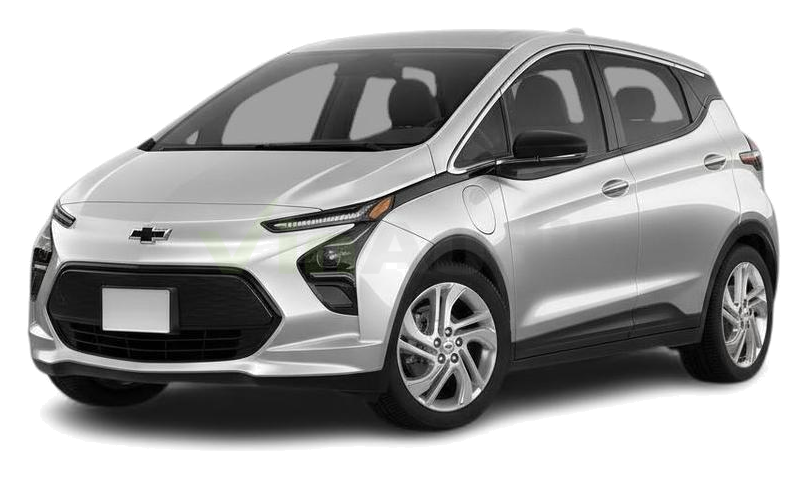The Good
The 2023 Bolt EV offers brisk acceleration and nimble handling, appealing to emotional buyers seeking a fun drive. Practically, its 259-mile EPA range, exceptional efficiency, and low starting price provide outstanding value. Comfort is enhanced by a quiet cabin, while its compact design makes city parking easy. Post-recall battery confidence contributes to perceived reliability.
The Bad
Known weaknesses include its relatively slow DC fast charging speeds compared to rivals and some complaints about interior material quality, specifically hard plastics. The front seats can also be uncomfortable for longer trips for some drivers. While 2023 models have updated batteries, the past battery recall history may affect resale perception for some buyers.
2023 Chevrolet Bolt EV: Quick Overview
- Motor: Single Permanent Magnetic Drive Motor
- Horsepower: 200 hp (150 kW)
- Torque: 266 lb-ft (360 Nm)
- Battery: 65 kWh lithium-ion battery pack
- EPA-Estimated Range: 259 miles (417 km)
- Fuel Economy (MPGe): 120 MPGe combined (131 city / 109 highway)
- 0-60 mph: Approximately 6.5 seconds
- Towing Capacity: Not rated for towing
- Charging:
- Level 2 (240V): Full charge in approximately 7 hours
- DC Fast Charging: Adds approximately 100 miles of range in 30 minutes - Key Trim-Level Features:
- 1LT (Base Trim):
- 10.2-inch diagonal HD color touchscreen
- Wireless Apple CarPlay® and Android Auto™ capability
- Chevy Safety Assist (Automatic Emergency Braking, Front Pedestrian Braking, Lane Keep Assist with Lane Departure Warning, Forward Collision Alert, IntelliBeam auto high beams, Following Distance Indicator)
- LED headlamps and taillamps
- Keyless Open and Start
- 17-inch silver-painted aluminum wheels
- Cloth seats
- 2LT (Uplevel Trim):
- (Includes all 1LT features plus):
- Leather-appointed seating surfaces
- Heated front seats and heated steering wheel
- 8-way power-adjustable driver's seat
- Rear Cross Traffic Alert
- Lane Change Alert with Side Blind Zone Alert
- Rear Park Assist
- Integrated roof rails
- Available Adaptive Cruise Control
- Available Bose® premium 7-speaker audio system
- 1LT (Base Trim):
2023 Chevrolet Bolt EV Specifications
Vehicle Information
| Year | 2023 |
| Make | Chevrolet |
| Model | Bolt EV |
| Trim | - |
| Style | - |
| Type | Sedan |
| Category | Compact Car |
Manufacturing Details
| Made In | United States |
| Manufacturing City | ORION |
Dimensions
| Doors | 4-Door |
| Curb Weight | - |
| Gross Vehicle Weight Rating | - |
| Overall Height | - |
| Overall Length | - |
| Overall Width | - |
| Wheelbase Length | - |
| Standard Seating | 5 |
Engine & Performance
| Engine | Electric |
| Engine Size | 6.6L |
| Engine Cylinders | 8 |
| Transmission | 1-Speed Automatic |
| Transmission Type | Automatic |
| Transmission Speeds | 1-Speed |
| Drivetrain | Front-Wheel Drive |
Additional Features
| Anti-Brake System | Standard |
| Steering Type | - |
Pricing
| Manufacturer Suggested Retail Price (MSRP) | - |
| Invoice Price | - |
| Delivery Charges | - |
Vehicle History Report
Specifications
History
Events
History Check
Check
Check
Check
Check
Listings
Recalls
Check
Analysis
What Problems Does the 2023 Chevrolet Bolt EV Have?
Common minor complaints, often consistent across various car brands, might include occasional infotainment system glitches, which can often be resolved with software updates or a simple reset. Some owners have reported concerns about the long-term durability of certain interior plastics, or comfort issues with the seats on extended drives. However, these are generally not widespread or critical issues. Long-term reliability for electric vehicles, in general, is often touted as superior due to fewer moving parts compared to internal combustion engines. The Bolt EV's electric motor and drivetrain are robust. Battery degradation is a natural process for any EV, but the 8-year/100,000-mile warranty on the battery and electric propulsion components offers significant peace of mind. Overall, the 2023 Bolt EV is expected to be a reliable vehicle, unburdened by the battery issues of its predecessors.
How long will the 2023 Chevrolet Bolt EV last?
Long-term weaknesses primarily revolve around battery degradation, which is a gradual loss of capacity over many years and charge cycles, leading to a slight decrease in range. However, modern EV batteries are designed to minimize this, and a significant drop in capacity within the warranty period would be covered. Other components like suspension, bearings, and the 12V auxiliary battery will eventually require replacement, similar to any vehicle. The regenerative braking system extends the life of friction brakes considerably.
What Technology & Safety Features are Included?
In terms of driver-assistance and safety, all 2023 Bolt EV models come standard with the comprehensive Chevy Safety Assist suite. This package includes Automatic Emergency Braking, Front Pedestrian Braking, Lane Keep Assist with Lane Departure Warning, Forward Collision Alert, IntelliBeam auto high beams, and a Following Distance Indicator. These features actively work to prevent or mitigate collisions. On the 2LT trim, additional safety features become standard, such as Rear Cross Traffic Alert, Lane Change Alert with Side Blind Zone Alert, and Rear Park Assist, enhancing situational awareness. Adaptive Cruise Control is an available option for the 2LT.
Passive safety includes 10 airbags, StabiliTrak electronic stability control, and a standard Rear Vision Camera. As for crash-test ratings, the 2023 Chevrolet Bolt EV has received a 5-star overall safety rating from the National Highway Traffic Safety Administration (NHTSA), indicating excellent performance in crash protection. The Insurance Institute for Highway Safety (IIHS) has not yet awarded a "Top Safety Pick" for the 2023 Bolt EV specifically, but previous model years have performed well in their individual crash tests, achieving good ratings in most categories, including moderate overlap front, side, and roof strength.
What Colors Options are Available?
2023 Chevrolet Bolt EV Prices and Market Value
Current used market prices for 2023 models are still relatively high due to their recent introduction and the discontinuation of the Bolt EV line. However, older used Bolt EVs (2017-2021) were significantly impacted by the battery recall, which temporarily depressed their values. Post-recall 2022 and 2023 models, with their new batteries, have seen better value retention. Factors affecting resale value include the trim level, optional features, battery health and mileage, overall condition, and the ever-evolving EV market with new competitors. The Bolt EV's discontinuation after 2023 might create a unique dynamic, possibly supporting values for its proven affordability and range, or conversely, leading to steeper depreciation as newer EV models emerge.
2023 Chevrolet Bolt EV Cost of Ownership
2023 Chevrolet Bolt EV Fuel Efficiency
2023 Chevrolet Bolt EV Safety Rating
NHTSA
2023 Chevrolet Bolt EV Insurance
reasonable repair costs.
How Does the 2023 Chevrolet Bolt EV Compare to Other Sedan?
Feature-wise, the Bolt EV provides a generous 10.2-inch touchscreen with wireless Apple CarPlay® and Android Auto™ as standard, matching or exceeding rivals. The Kona Electric might offer a slightly more upscale interior feel, while the Nissan Leaf includes its ProPilot Assist suite for advanced driver aids. The Bolt's Chevy Safety Assist suite is comprehensive for its price point.
Reliability for the 2023 Bolt EV is expected to be strong, as it comes with a new, corrected battery, mitigating the issues that plagued earlier models. The Hyundai Kona Electric and Nissan Leaf also have generally good reliability reputations for their electric powertrains. However, the shadow of the past battery recall on older Bolts might still influence public perception.
Price is where the 2023 Bolt EV truly shined. With its sub-$28,000 starting MSRP (before destination and any tax credits), it was often considerably more affordable than a comparable Hyundai Kona Electric (which typically starts higher) and offered significantly more range than a similarly priced Nissan Leaf. This aggressive pricing, coupled with its range, made it an exceptional value.
Alternatives:
- Hyundai Kona Electric: A strong alternative if you desire faster DC fast charging, a slightly more refined interior, and don't mind a higher price tag.
- Nissan Leaf (SV/SL Plus): Offers a comfortable ride and some advanced safety tech, but generally has less range and slower charging than the Bolt EV at a similar price point.
- Tesla Model 3 (base RWD): A significant step up in price but offers vastly superior charging infrastructure (Supercharger network), longer range, and more advanced tech.
- Chevrolet Equinox EV (upcoming): For those not in a rush, the upcoming Equinox EV will offer more space, faster charging, and modern GM EV tech, likely at a competitive price for its size.
Final Verdict: Is the 2023 Chevrolet Bolt EV a Good Sedan?
It is definitely worth buying, especially considering its competitive new pricing and eligibility for federal tax credits, making it one of the best value propositions in the EV market. A new 2023 Bolt EV (either 1LT or 2LT trim) is an excellent choice if you qualify for the tax credit, as you get a factory-new battery and full warranty.
For those considering used, a 2022 or 2023 Bolt EV with the updated battery is highly recommended. Older 2017-2021 models that have undergone the battery replacement recall also offer fantastic used value, provided you verify the replacement has been completed. The 2LT trim adds desirable comfort and convenience features like heated seats and advanced safety for a modest price increase, often making it the sweet spot for value and amenities.

